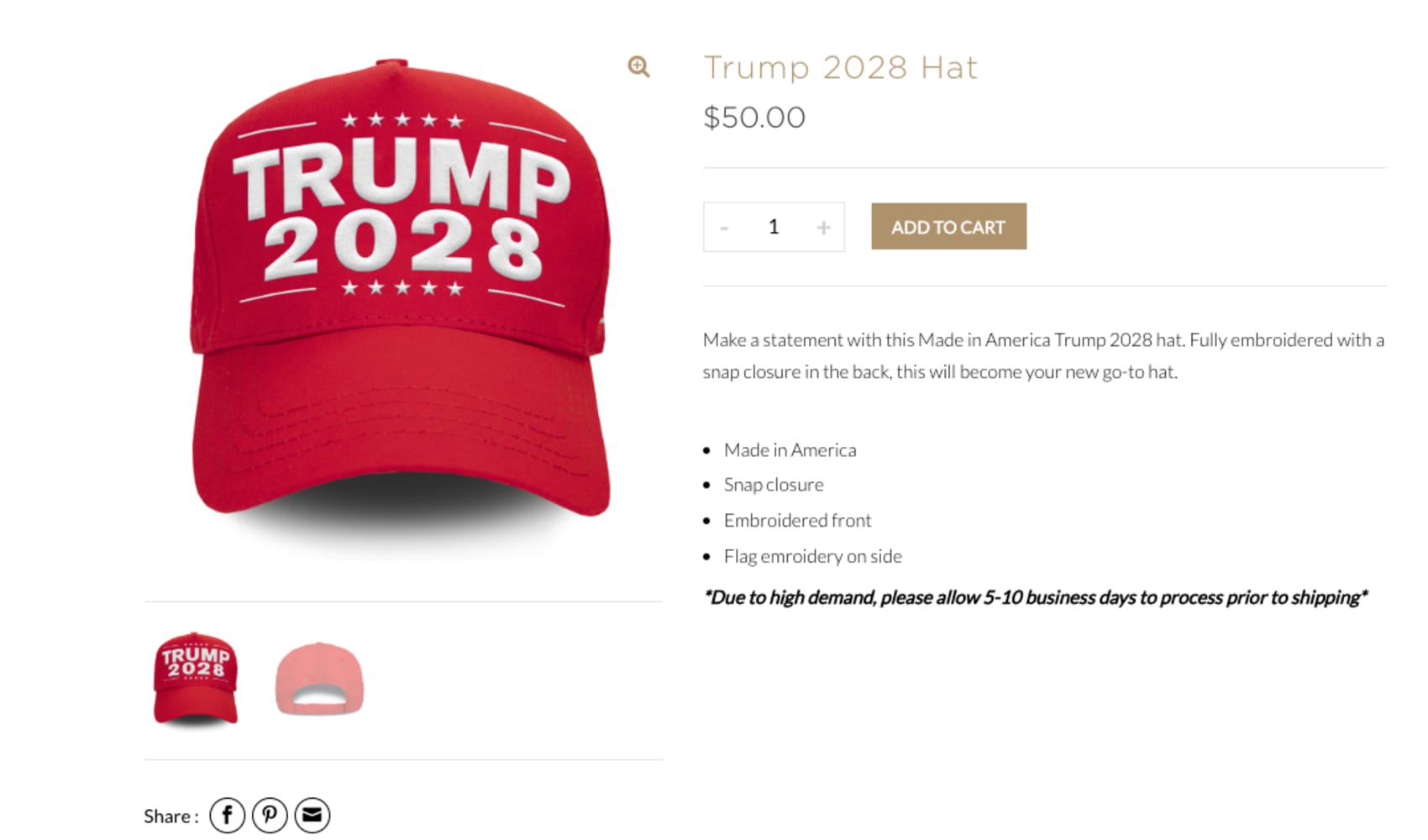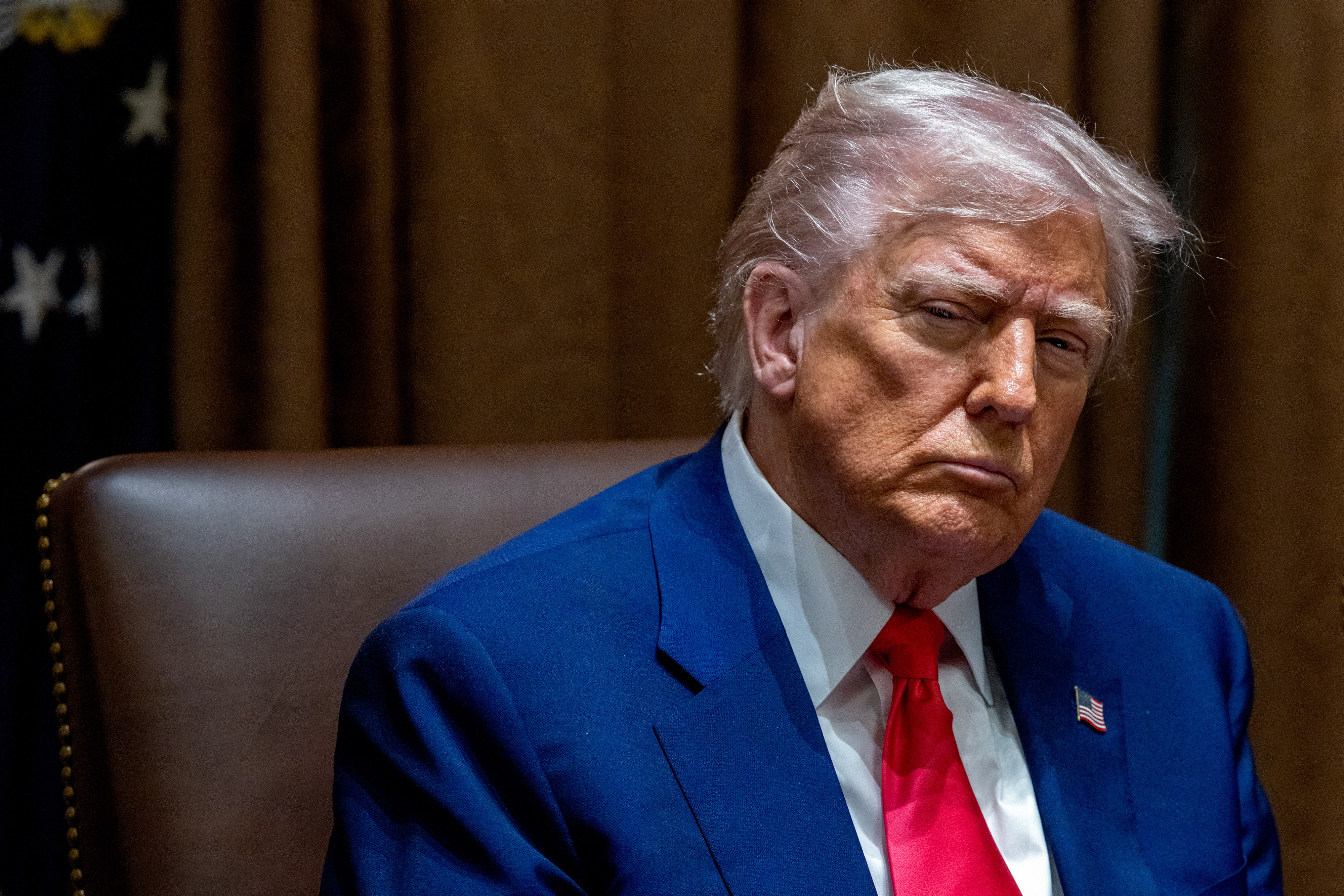Trump 2028 Hats: Is a Third Term Really Possible?
Trump 2028? Hats and Shirts Spark Third Term Speculation
Introduction: A Red Hat and a Whole Lot of Questions
It's the question that refuses to die: could Donald Trump be eyeing a return to the White House beyond the standard two-term limit? The latest twist? The Trump Organization is now selling "Trump 2028" hats and shirts. Yes, you read that right. And naturally, it's setting the internet – and political circles – ablaze. Is this a hint, a gaffe, or just a clever marketing ploy? Let's dive in and try to unpack this potentially explosive situation.
The "Trump 2028" Merch: What's the Deal?
On Thursday, the online store associated with the Trump Organization started offering red hats and T-shirts emblazoned with the words "Trump 2028." This seemingly innocuous piece of apparel has reignited the never-ending debate about whether the former president has designs on circumventing the 22nd Amendment, which clearly limits presidents to two terms. Is it a trial balloon being floated to gauge public reaction? A fundraising stunt? Or something more nefarious?
The 22nd Amendment: The Elephant in the Room
Let's be clear: the 22nd Amendment of the U.S. Constitution, ratified in 1951, states unequivocally that "no person shall be elected to the office of the President more than twice." So, a direct third term for Trump is constitutionally impossible. However, that hasn't stopped speculation, or the sale of those eye-catching hats.
Bannon's Bold Prediction: A Third Term Victory?
Fueling the fire is none other than Steve Bannon, former White House advisor, who recently declared that "President Trump is going to run for a third term" and, crucially, that he will be reelected. Bannon's pronouncements, known for their… colorful… nature, have added a layer of intrigue to this already perplexing situation. Is he just stirring the pot, or does he have inside information we don't?
Official Silence: No Comment from the Trump Organization
Adding to the mystery is the deafening silence from the Trump Organization itself. When contacted for comment on the "Trump 2028" merchandise, the organization remained tight-lipped. The White House, when prompted, simply referred inquiries back to the Trump Organization. This lack of a denial speaks volumes, doesn't it?
Legal Loopholes: Could Trump Pull a Fast One?
While a direct third term is prohibited, some legal scholars have, over the years, floated hypothetical scenarios involving constitutional conventions or challenges to the existing amendment. These are highly unlikely and would face intense legal and political opposition. But the fact that such discussions even exist highlights the desire in some corners to see Trump back in power.
Why the 2028 Date? Decoding the Symbolism
Why 2028? Well, Trump will be 82 years old by then. Some suggest the date is purely a provocation, designed to irritate his opponents and energize his base. Others believe it's a long-term strategy, perhaps related to succession planning or a broader political movement. Whatever the rationale, the choice of that particular year is definitely not random. It's a calculated move designed to grab attention.
Fundraising Frenzy: Monetizing the Controversy
Let's be honest: the "Trump 2028" merchandise is likely a massive fundraising opportunity. By selling these provocative items, the Trump Organization is tapping into the deep pockets of his supporters, who are eager to show their loyalty and contribute to his political endeavors. It's a win-win for Trump, regardless of whether he intends to run in 2028.
The Reaction: Outrage and Enthusiasm in Equal Measure
As expected, the "Trump 2028" gear has elicited a strong reaction from both sides of the political spectrum. Critics see it as a dangerous flirtation with authoritarianism, while supporters view it as a harmless expression of their unwavering devotion. The controversy itself is, of course, part of the plan. Polarization is Trump's brand, and this plays right into it.
Political Pundits Weigh In: Speculation Runs Rampant
Political commentators are having a field day analyzing the "Trump 2028" situation. Some dismiss it as a publicity stunt, while others see it as a sign that Trump is seriously considering unconventional strategies to regain power. The truth, as always, is likely somewhere in between. The only certainty is that this will dominate the political conversation for weeks to come.
The Long Game: Building a Political Dynasty?
Even if Trump doesn't run in 2028, the "Trump 2028" branding could be a way to maintain his influence over the Republican Party and potentially pave the way for a family member to run in the future. Think of it as a dynasty in the making. The Trump name is a powerful brand, and it's not going away anytime soon.
The Impact on the 2024 Election: A Distraction or a Strategy?
How does all of this affect the upcoming 2024 election? It could serve as a distraction, diverting attention from other important issues. Or it could be a deliberate strategy to energize his base and solidify his position as the undisputed leader of the Republican Party. Either way, it's a calculated risk with potentially significant consequences.
The Constitution: An Inconvenient Truth?
Let's not forget the Constitution. The 22nd Amendment is pretty clear. While there may be legal challenges or hypothetical loopholes discussed, the reality is that a third term would require a major constitutional crisis. Is Trump willing to push the country to that point? That's the million-dollar question.
The Broader Implications: Erosion of Democratic Norms?
The "Trump 2028" saga raises broader concerns about the erosion of democratic norms and the increasing polarization of American politics. When the very foundations of our constitutional system are questioned, it weakens our democracy. We must remain vigilant in defending the rule of law and the peaceful transfer of power.
Beyond the Hats: The Enduring Power of Trumpism
Ultimately, the "Trump 2028" hats and shirts are just symbols. The real story is about the enduring power of Trumpism and the unwavering support he commands from a significant portion of the American electorate. Whether he runs again or not, his influence on the political landscape will continue to be felt for years to come. He's a force to be reckoned with, regardless of the 22nd Amendment.
Conclusion: A Provocation, a Possibility, or Pure Profit?
So, is the "Trump 2028" merchandise a serious attempt at a third term, a clever marketing stunt, or just a way to keep Trump's name in the headlines and his coffers full? The answer is likely a combination of all three. While a third term is constitutionally problematic, the controversy surrounding the merchandise serves to energize his base, raise money, and keep him relevant. One thing's for sure: it's a masterful display of political theater.
Frequently Asked Questions
Here are some frequently asked questions about the "Trump 2028" controversy:
- Is it legal for Donald Trump to run for a third term as President?
No. The 22nd Amendment to the U.S. Constitution limits presidents to two terms in office.
- Why is the Trump Organization selling "Trump 2028" merchandise if he can't run?
It's likely a fundraising and marketing tactic designed to energize his supporters, keep his name in the news, and potentially lay the groundwork for future political endeavors, even if not directly for him.
- What does Steve Bannon mean when he says Trump will run for a third term?
Bannon's comments are likely meant to be provocative and may reflect a desire for Trump to remain a powerful force in American politics, even if he can't hold office again. He may believe loopholes can be found, or is just stoking the fire.
- Could the Constitution be amended to allow Trump to run again?
While technically possible, amending the Constitution is a very difficult process that requires a two-thirds vote in both houses of Congress and ratification by three-quarters of the states. It's highly unlikely.
- Is this just a publicity stunt?
It's almost certainly at least partly a publicity stunt. Trump is a master of capturing media attention, and this controversy keeps him in the spotlight.


